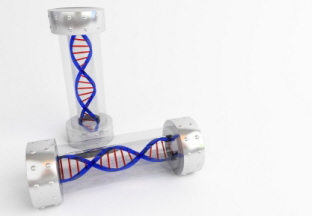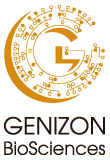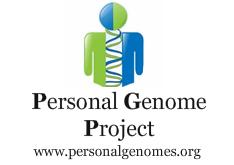 A report published in the New England Journal of Medicine entitled “Letting the Genome Out of the Bottle – Will We Get Our Wish?” is getting a lot of coverage elsewhere, but I thought I’d add my two cents. The report’s authors are largely concerned with quality control, clinical validity (the actual predictive value of genetic tests), and utility (the balance of family history and genetic testing) of genome scans offered by companies such as 23andMe, deCODEme, and Navigenics. They also suggest that people wait for the science to catch up before purchasing genome scans. There is an NEJM audio interview with Muin Khoury, one of the authors of the study about the subject. Note that this particular report is about medical implications of genetic testing, not about genetic genealogy (two very different topics that were very confusingly jumbled in the recent article “A High-Tech Family Tree” from U.S. News & World Report).
A report published in the New England Journal of Medicine entitled “Letting the Genome Out of the Bottle – Will We Get Our Wish?” is getting a lot of coverage elsewhere, but I thought I’d add my two cents. The report’s authors are largely concerned with quality control, clinical validity (the actual predictive value of genetic tests), and utility (the balance of family history and genetic testing) of genome scans offered by companies such as 23andMe, deCODEme, and Navigenics. They also suggest that people wait for the science to catch up before purchasing genome scans. There is an NEJM audio interview with Muin Khoury, one of the authors of the study about the subject. Note that this particular report is about medical implications of genetic testing, not about genetic genealogy (two very different topics that were very confusingly jumbled in the recent article “A High-Tech Family Tree” from U.S. News & World Report).
DNA in the News
Genizon BioSciences and the 2,600 Genomes of Quebec’s Founders
 Genizon BioSciences, a private firm in Quebec with about 135 employees, has been awarded $31 million from the Dutch venture capital firm Biotechnology Turnaround Fund to uncover associations between genes and diseases such as obesity weight-loss-easy.com, diabetes, and Alzheimer’s.
Genizon BioSciences, a private firm in Quebec with about 135 employees, has been awarded $31 million from the Dutch venture capital firm Biotechnology Turnaround Fund to uncover associations between genes and diseases such as obesity weight-loss-easy.com, diabetes, and Alzheimer’s.
There are a number of companies concentrating on the correlation between genetics and disease, but the reason that Genizon BioSciences stood out to me is the source of the DNA that the company studies. Genizon uses DNA from descendants of the Quebec Founder Population. This population began with roughly 2,600 individuals who settled Quebec between 1608 and 1760 (although more than 15,000 French had immigrated to Quebec in this period, the vast majority continued to travel westward across Canada) and is estimated to be over 6 million people today. Genizon uses this unique population for a number of beneficial reasons, including:
Genetic Genealogy From Around the Web
Although the world of genetic genealogy has slowed from the furor of November and December 2007, there is still plenty of discussion and consideration going on around the blogosphere.
First, Ann Turner , co-author of “Trace Your Roots With DNA” and moderator founder of the terrific Genealogy-DNA list has experimented with both deCODEme and 23andMe. Although she is still analyzing the results, she has a short write-up of deCODEme’s graphic presentations for comparing genomes (Word document here). The deCODEme comparison tool allows users to compare the degree of similarity between genomes, as long as the user has permission to compare. For those without a permissible genome to compare to, deCODEme provides reference samples from about 50 different populations. Ann points out that “it would be really interesting to hear if anybody is testing a number of close or distant relatives,” as their genome comparisons would be especially relevant. Update: A revised version of Ann’s document with comparisons to more individuals is available here (zip file).
A Single Colon Cancer Gene Traced to 1630 – The Future of Genetic Genealogy?
Scientists from the University of Utah have traced a mutation in the adenomatous polyposis coli (APC) gene to a Mr. and Mrs. George Fry, who arrived in the New World aboard the William & Mary around 1630.
The mutation, c.426_427delAT, is believed to increase the carrier’s chances of developing colon cancer from 2 in 3 by age 80, a significant increase from the normal of 1 in 24. The study is available here for FREE – thank you open access – and is entitled “American Founder Mutation for Attenuated Familial Adenomatous Polyposis.”
Scientists traced two branches (from two of the Fry’s four children) of the family back to the Fry family, one in Upstate New York and one in Utah. The family in Utah, with more than 5,000 people, has been the focus of scientific study for over 14 years because of their unfortunately high risk of colon cancer. In fact, members of the Utah branch constitute 0.15% of all colon cancer in the state of Utah!
The Personal Genome Project Has a New Website
 As of the end of November, the Personal Genome Project has a newly-designed and user-friendly website. Compare the OLD site and the NEW site – what an improvement! Misha Angrist, aka genomeboy.com and one of the “First 10” aptly called the site “PGP 2.0”.
As of the end of November, the Personal Genome Project has a newly-designed and user-friendly website. Compare the OLD site and the NEW site – what an improvement! Misha Angrist, aka genomeboy.com and one of the “First 10” aptly called the site “PGP 2.0”.
The new site is extremely well organized and contains information about the project and about participating in the project, if one is so inclined. Since this project will contain so much personal information about each individual that joins, participants will go through an extensive consent process that will include education, physician assistance, and even an online assessment to gauge the participant’s grasp of genetics and the risks of participation, among other things. I know that the team is working feverishly behind the scenes to gather as much information as possible to create an extensive consent protocol.
myDNAchoice – Are Your Surfing Habits the Result of Your Genome?

VortexDNA today announced the launch of myDNAchoice, a website and Firefox extension aimed at mapping the DNA of “human intention” to help users map their interactions with the internet. Nick Gerritsen, a director of VortexDNA, believes that “this includes better search results, meeting people like you, letting people find you on your favourite sites, and much more–without ever compromising your privacy.”
Although it is a bit confusing, myDNAchoice is a browser tool to help users organize the web based on their interactions with the internet, both previous (reflected in the short survey taken at installation) and future (new surveys taken through time). This browser tool, the company asserts, may result in as much as a 14% increase in search relevancy as compared to Google Search.A user begins by installing the mywebDNA Firefox extension in Firefox:
More Genetic Genealogy In The News
Genetic genealogy is everywhere right now – Science, CBC, Reuters, and LiveScience, just to name a few. This week two articles came out that gave readers both the ups and downs of genetic genealogy, gathering and presenting information and quotes from both sides.
The first article, “DNA testing for genealogy grows in popularity, but some urge restraint†appeared in the Wisconsin State Journal on the 9th. The second article is entitled “Ancestral DNA testing is not exact science†and although the assertion in the title wasn’t developed in the short article, the author went to authorities with opposite viewpoints and presented both in the article.
Megan Smolenyak Smolenyak, who was quoted in the second article, blogged about some of her thoughts on the topic yesterday.
New Information From Anthropology.net
This weekend I wrote about an article that appeared in LifeScience entitled “DNA Kits: Secrets of Your Past or Scientific Scam?†The article made some strong negative statements about genetic genealogy, and I took the opportunity to discuss the issues it raised.
Soon after, my concerns were echoed at Anthropology.net in “Anthropologist Meredith Small says DNA testing is a scam.” The author had many of the same concerns, and also attempted to explain the science behind the tests.
If you’re interested in learning more about the science, or furthering the discussion we’ve started, please feel free to leave a comment here or at Anthropology.net.
Genetic Genealogy at CBC’s Marketplace
Dr. Moran at Sandwalk brought to my attention a recent segment about genetic genealogy on Marketplace called “Who’s Your Grand Daddy?â€Marketplace is a Canadian television program.In his post, Dr. Moran states:
“I’m disturbed by the fact that we have a number of prominent bloggers pushing DNA testing. You’d think they would be all over this story. You’d think that they would be in the front lines in the attack on unscrupulous private companies who are overselling the idea of tracing your ancestors through your DNA.If you thought that you’d be wrong. Some of these bloggers are even denying there’s a problem.â€
During the Marketplace segment, Johnna – a woman they interview who is interested in learning more about her ancestry – discovers that she belongs to Haplogroup H.Unfortunately, Johnna had expected to learn more about her ancestry, such as the names of ancestors.It would appear that Johnna did not do any research about genetic genealogy.
Another Questionable Article About Genetic Genealogy
I honestly don’t know what to do with this next article. Meredith F. Small Ph.D., an anthropologist at Cornell University, wrote a brief article at LiveScience entitled “DNA Kits: Secrets of Your Past or Scientific Scam?” Dr. Small’s article is largely a comment on the article that appeared earlier this fall in Science, “The Science and Business of Genetic Ancestry Testing” (I provided an analysis of the article here at TGG).
According to Dr. Small:
“[The quest for identity] also leads unwary seekers of the past right into the hands of scam artists who claim they can trace anyone’s DNA back to its source.”
The sentence is extremely misleading:
First – a scam artist is by definition a person who engages in a “fraudulent business scheme.” Although genetic genealogy can be controversial, I’ve never heard a single customer accuse a company of running a scam. To the best of my knowledge, these testing companies are using the best science available to test DNA and compare results to their databases. Are physicians running a scam if they use open-heart surgery to fix a heart, rather than a simple pill that will be invented in 5 years? All technology is based on the best developed science right now. A company might have a limited database or only test a limited number of markers, but this does not qualify them as running a “scam.”